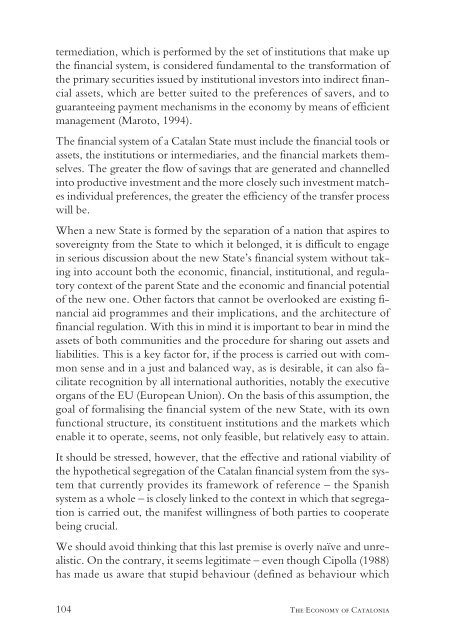The Economy of Catalonia
the_economy_of_catalonia._questions_and_answers_on_the_economic_impact_of_independence
the_economy_of_catalonia._questions_and_answers_on_the_economic_impact_of_independence
Create successful ePaper yourself
Turn your PDF publications into a flip-book with our unique Google optimized e-Paper software.
termediation, which is performed by the set <strong>of</strong> institutions that make up<br />
the financial system, is considered fundamental to the transformation <strong>of</strong><br />
the primary securities issued by institutional investors into indirect financial<br />
assets, which are better suited to the preferences <strong>of</strong> savers, and to<br />
guaranteeing payment mechanisms in the economy by means <strong>of</strong> efficient<br />
management (Maroto, 1994).<br />
<strong>The</strong> financial system <strong>of</strong> a Catalan State must include the financial tools or<br />
assets, the institutions or intermediaries, and the financial markets themselves.<br />
<strong>The</strong> greater the flow <strong>of</strong> savings that are generated and channelled<br />
into productive investment and the more closely such investment matches<br />
individual preferences, the greater the efficiency <strong>of</strong> the transfer process<br />
will be.<br />
When a new State is formed by the separation <strong>of</strong> a nation that aspires to<br />
sovereignty from the State to which it belonged, it is difficult to engage<br />
in serious discussion about the new State’s financial system without taking<br />
into account both the economic, financial, institutional, and regulatory<br />
context <strong>of</strong> the parent State and the economic and financial potential<br />
<strong>of</strong> the new one. Other factors that cannot be overlooked are existing financial<br />
aid programmes and their implications, and the architecture <strong>of</strong><br />
financial regulation. With this in mind it is important to bear in mind the<br />
assets <strong>of</strong> both communities and the procedure for sharing out assets and<br />
liabilities. This is a key factor for, if the process is carried out with common<br />
sense and in a just and balanced way, as is desirable, it can also facilitate<br />
recognition by all international authorities, notably the executive<br />
organs <strong>of</strong> the EU (European Union). On the basis <strong>of</strong> this assumption, the<br />
goal <strong>of</strong> formalising the financial system <strong>of</strong> the new State, with its own<br />
functional structure, its constituent institutions and the markets which<br />
enable it to operate, seems, not only feasible, but relatively easy to attain.<br />
It should be stressed, however, that the effective and rational viability <strong>of</strong><br />
the hypothetical segregation <strong>of</strong> the Catalan financial system from the system<br />
that currently provides its framework <strong>of</strong> reference – the Spanish<br />
system as a whole – is closely linked to the context in which that segregation<br />
is carried out, the manifest willingness <strong>of</strong> both parties to cooperate<br />
being crucial.<br />
We should avoid thinking that this last premise is overly naïve and unrealistic.<br />
On the contrary, it seems legitimate – even though Cipolla (1988)<br />
has made us aware that stupid behaviour (defined as behaviour which<br />
104 <strong>The</strong> <strong>Economy</strong> <strong>of</strong> <strong>Catalonia</strong>


